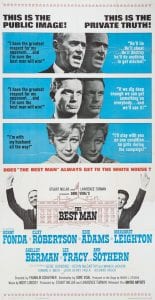 Anthology of Awful: Political Nostalgia in Film
Anthology of Awful: Political Nostalgia in Film
By: Jacob deBlecourt
**Spoilers Ahead**
In an election season as bitter and contentious as this one, some may look to politics–and politicians–of the past in order to feel a sense of normalcy. What makes this feeling interesting is that it does not always respect party lines; liberal-leaning satirists like Stephen Colbert and Samantha Bee, for example, have waxed nostalgically about George W. Bush and Bob Dole. Even the Richard Nixon Presidential Library has started tweeting #notNixonian when it wishes to distance itself from the current administration. While it is easy to look back on earlier life experiences fondly, The Best Man, based on Gore Vidal’s play of the same name, is unsettling because it reminds audiences that politics have never really changed.
The Best Man stars Cliff Robertson as Senator Joe Cantwell, a brash politician who makes up for his lack of experience and intellect with overtly “masculine” toughness and a determination to do whatever it takes to get elected (sound familiar?). His primary opponent, Former Secretary of State William Russell (played by Henry Fonda), an Adlai Stevenson-type for all you political nerds, is a measured but indecisive technocrat. Both characters have dirt on each other that could effectively end their respective campaigns: William Russell had a nervous breakdown that brought into question his ability to lead and Joe Cantwell *gasp* possibly had a gay experience while in the military–or, as the 1964 film put it, he was a “dee-generate.” The film follows these two candidates on the day of their party’s convention.
It is very easy to view a film like The Best Man as quaint, but the reality is that politics and, perhaps more importantly, politicians, seldom change when it comes to mudslinging and competitiveness.
What surprises me about this film is how disappointingly relevant it is to today. It is not out of the realm of possibility nowadays for a candidate’s mental health to be brought into question unscrupulously. As controversial as it is, a number of psychologists have spoken out against the generalities made about President Trump’s health and the effect it has on those with diagnosed mental illnesses: “Regardless of how one views the President, those who care about the well-being of persons with serious mental illness ought to unanimously condemn the accusations of mental illness being lodged against him. In the absence of any diagnosis by a qualified professional, the accusations amount to nothing more than careless generalities” (Baldwin, 1). Similarly, politicians’ private lives, specifically their sexual accounts, can be fodder for mean-spirited political attacks. Jim McGreevey, former Governor of New Jersey, resigned after he revealed he “engaged in an adult consensual affair with another man” (Kohen, 1). This was in 2004, less than a decade before New Jersey legalized same-sex marriage. It is very easy to view a film like The Best Man as quaint, but the reality is that politics and, perhaps more importantly, politicians, seldom change when it comes to mudslinging and competitiveness.
The Best Man ends in an unusual way. Rather than let Cantwell smear his campaign with the rhetoric of his mental background and thus take the nomination, Russell chooses to endorse a dark-horse candidate few even reasonably considered. When candidates play the game of dirty politics, nobody wins.
Some people may look at this film and think that, because nothing has changed, there is no point in trying to change the future. As tempting as it is to go down that nihilistic path, I choose to look at the failings of historical and contemporary politics as the grounds from which real change can be made. In many ways, films like The Best Man add to what I call the Anthology of Awful, a mental database of politics’ greatest blunders and embarrassments. We need to not revere the past, but learn from it.
Works Cited:
- Baldwin, Marjorie. “Playing Politics with Mental Illness.” Psychology Today, Sussex Publishers, 10 July 2017, www.psychologytoday.com/us/blog/beyond-schizophrenia/201707/playing-politics-mental-illness.
- Kohen, Yael. “McGREEVEY TO QUIT, DECLARES ‘I AM A GAY AMERICAN’.” The New York Sun, 13 Aug. 2004, www.nysun.com/new-york/mcgreevey-to-quit-declares-i-am-a-gay-american/245/.



Great article and particularly relevant with an election just days away.